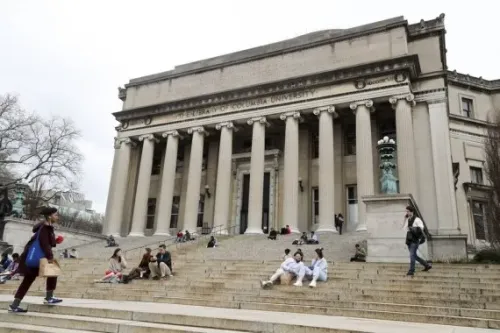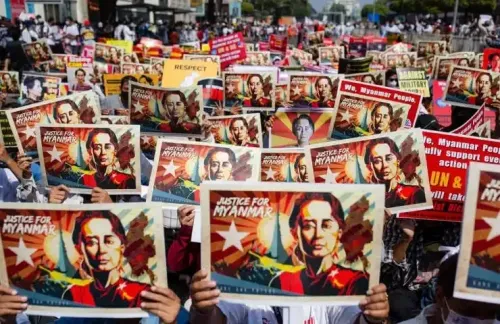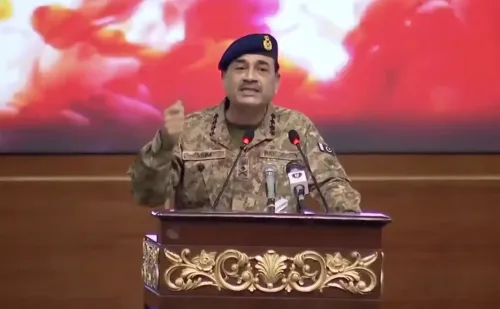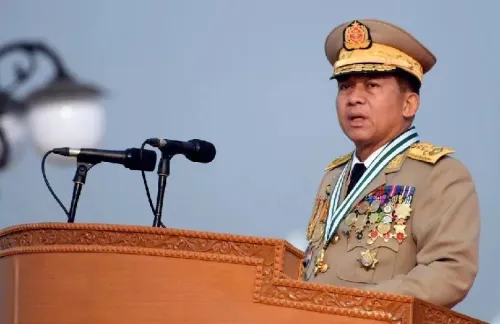Why is Trump Shifting His Stance Amid GOP Dissent?

Synopsis
Key Takeaways
- Trump's shift reflects growing dissent within the Republican Party.
- Release of Epstein documents could implicate many influential figures.
- Trump's influence appears to be waning among his base.
- Ghislaine Maxwell's conviction highlights the severity of Epstein's crimes.
- Calls for transparency are coming from both sides of the political aisle.
New York, Nov 17 (NationPress) Confronted with a growing dissent within the Republican Party, US President Donald Trump has publicly shifted his stance on a previously rigid position. He urged party members in Congress to support the release of documents related to convicted billionaire pedophile, Jeffrey Epstein. After previously threatening those advocating for the file release and labeling one as a “traitor,” Trump stated on Sunday, “We have nothing to hide,” encouraging legislators to proceed with the vote scheduled for Tuesday.
This marks the second retreat by Trump within a week: On Friday, he lifted tariffs on various food items, including tea, mango, and cashew nuts imported from India, as escalating prices were fueling opposition.
Epstein was embroiled in a complex web of sex, politics, wealth, and high society, involving numerous influential individuals connected to him for business or pleasure.
His firm managed the assets of wealthy clients and he frequently acted as a business intermediary.
Convicted in Florida for procuring minors for prostitution, Epstein was under federal indictment for trafficking children when he was found dead in a New York jail cell, a death ruled as suicide by officials.
Ghislaine Maxwell, his accomplice and procurer, daughter of the late British media mogul Robert Maxwell, is currently incarcerated after being found guilty of aiding his crimes.
Epstein’s criminal network has implicated former Prince Andrew of Britain, who was stripped of his titles and ousted from royal residence by King Charles following allegations of child rape during his time as Epstein's guest.
Some emails from Epstein's collection have been made public by Democrats and other entities, revealing connections with numerous prominent figures.
The initial demands for the release of all Epstein-related documents originated from the hardliners within Trump’s support base, later taken up by Democrats advocating for legislation to make them public.
Republicans anticipate that the documents could entangle prominent Democrats and their allies, while Democrats hope to unearth material that could tarnish Trump.
Congress members Ro Khanna, a Democrat, and Thomas Massie, a Republican, have introduced legislation calling for the full disclosure of Epstein’s documents, which is up for a vote on Tuesday.
Speaker Mike Johnson attempted to postpone the vote but ultimately acquiesced after sufficient Representatives endorsed the demand.
Trump criticized the proposed legislation and significantly distanced himself from Representative Marjorie Taylor Greene, one of his steadfast advocates for document release, repeatedly labeling her a traitor.
Initially, Trump sought to shift the focus from the controversy by requesting the Justice Department investigate potential connections between former President Bill Clinton, former Treasury Secretary Larry Summers, and financial giant JPMorgan Chase to Epstein.
However, on Sunday, as it became evident that enough Republican members were poised to defy him and vote in favor, he attempted to quell the dissent that might indicate his waning influence over the base.
Earlier on Sunday, Khanna remarked during an NBC interview that Trump was losing touch with his base, stating, “He’s forgotten those forgotten Americans.”
He further clarified, “This isn’t solely about Donald Trump. I’m not sure how deeply involved he was. Many others must be held accountable.”
Trump’s opposition to releasing all documents, including those investigating Epstein’s case and his death, was unexpected as he had previously called for their disclosure during the 2024 campaign.
Taylor Moore suggested that foreign government pressure might be influencing Trump against the document release.
Others speculated that the potential for exposure of numerous high-profile individuals could be a factor.
Trump, who, like many in New York’s elite business circles, had interactions with Epstein, claimed he distanced himself due to disputes over Epstein attempting to recruit his employees from Mar-a-Lago. He insisted he expelled Epstein from membership.
Trump stated he was unaware of Epstein’s child trafficking activities, although an email surfaced in which Epstein claimed Trump was aware and instructed him to cease.
In a correspondence with a journalist, Trump asserted he never received a “massage” from Epstein.
One of Epstein’s victims, Virginia Giuffre, who implicated the former British prince and later took her own life, claimed Trump was not involved in any illicit activities.









